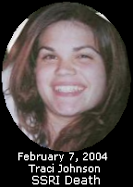"These are some facts that puzzle me:I'm still confused but researchers and physicians still swear antidepressants SSRIs are great for depression - funny that one of the side effects is depression -, headache, back pain and who knows what more.Here: "Neurotransmitter is a specialized messenger cell that transfers or sends information from one type of cell to another. Scientists have managed to identify over 100 neurotransmitters in the human brain alone, but evidence suggests we have significantly more than this number. An unfortunate aspect of not being able to identify all neurotransmitter cells is that researchers, especially those developing medications to act on specific messenger cells, can’t always determine why or how medications work or fail to work. (emphasis mine)
You’re probably familiar with some of the identified neurotransmitter names. These include dopamine, GABA, serotonin, acetylcholine, and norepinephrine. Each of these performs some specific functions in the body. For instance serotonin is indicated in mood stability, emotional response, and temperature control. Acetylcholine is a neurotransmitter that allows for the person to willfully or voluntarily use his or her muscles. While researchers can suggest the possible effects of certain neurotransmitters, they not only haven’t identified them all, but also are nowhere near determining all effects of the messenger cells that have been identified."
Here: "The neurotransmitters work by interacting with receptors. These are minute areas on the nerve or other cells that make the cell respond in the appropriate way. Some psychiatric drugs block these receptors, reducing the effect of a neurotransmitter. Others increase the level of a neurotransmitter, so its effects last longer. Because they all interact, changing the level of one neurotransmitter will change others; so however well a drug is targeted towards a particular receptor, it will have a knock-on effect on the whole system. One knock-on effect of many psychiatric drugs is to suppress acetylcholine, and this causes some of the side effects people experience."(emphasis mine)
Here: "The SSRIs are not selective for anything except that they act on all serotonin in the body.
Only 5% of this is in the brain. Five per cent. The other 95% is found throughout the body with large amounts being found in: the digestive system (stomach movement); the cardiovascular system (blood flow); blood cells (clotting); reproductive system (genitals); hormonal system (widespread effects on lots of physiological processes). All of which is acted upon by the drug. All of it."
Here: "Since we don’t understand the precise mechanism of each neurotransmitter or the true number of all that exist, we also can’t understand how medications, foods, or environmental exposure may affect these chemical messengers. Scientists and researchers must make educated guesses based on what is known, but the plethora of unknown information on these cells equates these theories to trying to playing darts in total darkness. Sometimes the guesses are pretty good; SSRIs for instance are reasonably effective for a lot of people. Other times these theories fail to work, since we’re guessing about what is essentially undiscovered territory, and we have no idea what other effects might be caused by raising or decreasing levels of certain chemicals made by the body."
Are you confused?"
They have even created a Prozac for dogs.










